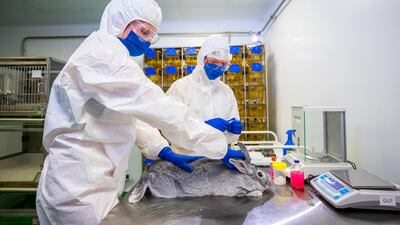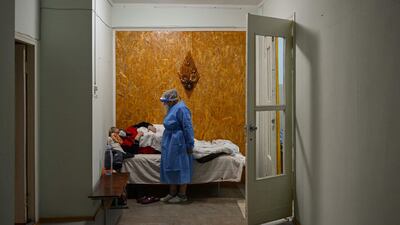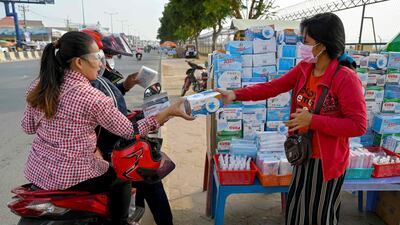Russia has registered the world's first vaccine against Covid-19 for animals, agriculture safety watchdog Rosselkhoznadzor said on Wednesday.
The country already has three coronavirus vaccines for humans, the best-known of which is Sputnik V. Moscow has also given emergency approval to two others, EpiVacCorona and CoviVac.
Named Carnivac-Cov, the vaccine for animals was developed by a unit of Rosselkhoznadzor, the watchdog said.
"The clinical trials of Carnivac-Cov, which started last October, involved dogs, cats, Arctic foxes, minks, foxes and other animals," said Rosselkhoznadzor's Deputy Head Konstantin Savenkov.
"The results of the trials allow us to conclude that the vaccine is harmless and highly immunogenic as all the vaccinated animals developed antibodies to the coronavirus in 100 per cent of cases."
Immunity lasts for six months after vaccination, but the shot's developers are continuing to analyse this, the watchdog said.
Mass production of the vaccine could start as early as April, Rosselkhoznadzor added.
Meanwhile, President Vladimir Putin, 68, on Sunday called on Russians to get inoculated against the virus, as vaccine distribution remains sluggish and septicism in the country remains high.
Speaking on Kremlin-controlled television, the Russian leader – who received a shot a few days ago – said getting vaccinated was "needed, even necessary".
"If a person wants to feel confident, does not want to get sick and have serious consequences after an illness, then it is better to get this vaccine, of course," news agencies quoted Mr Putin as saying.
Mr Putin received his first dose on Tuesday, but did not reveal which of Russia's three home-grown shots – Sputnik V, EpiVacCorona or CoviVac – he had been given.
Unlike many world leaders, the president also chose to be vaccinated in private.
Russia began its vaccination campaign in early December, but only about four million of the country's 144 million people have so far received two doses of a vaccine, while another two million have had a first dose.
Vaccine scepticism runs high in Russia, with a recent opinion poll showing that less than a third of the population is willing to receive a shot. Nearly two-thirds said they believe the coronavirus is a man-made biological weapon.
The country has been among the hardest hit by Covid-19, with more than 4.5 million cases.
Mr Putin on Sunday said Russia would be able to end the rest of its restrictions when about 70 per cent of adults had been vaccinated against the virus.
He predicted that this would happen by the end of the summer.











